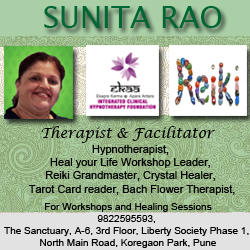Alternative Therapies
- Alternative Medicine
- Access Bars
- Access Body Processes
- Access Consciousness
- Access Energetic Faclift
- Acupressure
- Acupuncture
- Angel Healing
- Ayurveda
- Bach Flower Remedies
- Breathwork
- Cosmetic Acupuncture
- Crystal Healing
- Cupping Therapy
- Emotional Freedom Technique (EFT)
- Ergonomics
- Fengshui
- Heal Your Life
- Geopathic Stress
- Face Reading
- Graphology
- Heal Your Life
- Holistic Solutions
- Holy Fire Reiki
- Homeopathy
- Ho'oponopono
- Hoodoo
- Hypnotherapy
- Inner Child Therapy
- Jesus Reiki
- Jikiden Reiki
- Manual Therapy
- Meditation
- Melchizedek Method
- Motivational Counseling
- Mudra Healing
- Nadi Vaidya
- Naturopathy
- Neuro Linguistic Programming (NLP)
- Panchakarma (Ayurveda)
- Past Life Regression
- Physiotherapy
- Pranic Healing
- Pyramids
- Quantum Touch Healing
- Reiki
- Rudraksh
- Shamanic Healing
- Sound Healing
- Silva Mind Control Method
- Sujok therapy
- Tarot
- Theta Healing
- Unani Medicine
- Yoga
- Wicca
- Womb Healing
Diseases & Conditions
- Acne & Pimples
- Allergies
- Arthritis
- Asthma
- Behavioural Disorders
- Dandruff
- Diabetes
- Emotional Problems
- Gallstones
- Gastritis
- Hairloss
- Heart Diseases
- Hormonal Problems
- Hypertension
- Immune Disorders
- Infections
- Infertility
- Jaundice
- Kidney Disorders
- Liver Disorders
- Menstrual Disorders
- Migraine
- Neck & Back Pain
- Obesity
- Osteoporosis
- Peptic Ulcer
- Prevention
- Prostate Problems
- Psoriasis
- Sexual Dysfunctions
- Sinusitis
- Sleep Disorders
- Skin Diseases
- Stress
- Thyroid Disorders
- Ulcerative Colitis
- Urinary Infections
General Wellness
Emotional Counselling in Nashik
The Sanctuary - Ms. Sunita Rao

In her pursuit of finding better ways to heal the human body, mind and spirit Sunita Rao has been certified by internationally renowned organizations such as the EKAA School of Integrated Clinical Hypnotherapy and Heal Your Life based on the philosophy of Louise L Hays. She is also a Reiki Grandmaster Practicing and initiating in the Usui system of Reiki..

Dr. Geettanjali V. Saxenaa.

Past life Regression Trainer, Family Constellation Trainer, Theta Healing Trainer, Inner Child Work, Angel Therapist, Reiki healer, Hypnotherapy, Crystal Healing, Graphology, Tarot card reader & Astrologer


Ms. Anjali Nagpal
Anjali Nagpal is a business trainer, a life coach and workshop facilitator certified to present Heal Your Life transformational workshop worldwide (based on the philosophy of Louise L Hay) approved by Hay House, US. She also conducts others workshops relating to self healing.


EMOTIONAL PROBLEMS
There are common effects or conditions that may occur following a traumatic event. Sometimes these responses can be delayed, for months or even years after the event. Often, people do not even initially associate their symptoms with the precipitating trauma. The following are symptoms that may result from a more commonplace, unresolved trauma, especially if there were earlier, overwhelming life experiences: Physical* Eating disturbances (more or less than usual)
* Sleep disturbances (more or less than usual)
* Sexual dysfunction
* Low energy
* Chronic, unexplained pain Emotional
* Depression, spontaneous crying, despair and hopelessness
* Anxiety
* Panic attacks
* Fearfulness
* Compulsive and obsessive behaviors
* Feeling out of control
* Irritability, angry and resentment
* Emotional numbness
* Withdrawal from normal routine and relationships Cognitive
* Memory lapses, especially about the trauma
* Difficulty making decisions
* Decreased ability to concentrate
* Feeling distracted
* ADHD symptoms
The following additional symptoms of emotional trauma are commonly associated with a severe precipitating event, such as a natural disaster, exposure to war, rape, assault, violent crime, major car or airplane crashes, or child abuse. Extreme symptoms can also occur as a delayed reaction to the traumatic event. Re-experiencing the Trauma
* intrusive thoughts
* flashbacks or nightmares
* sudden floods of emotions or images related to the traumatic event Emotional Numbing and Avoidance
* amnesia
* avoidance of situations that resemble the initial event
* detachment
* depression
* guilt feelings
* grief reactions
* an altered sense of time Increased Arousal
* hyper-vigilance, jumpiness, an extreme sense of being "on guard"
* overreactions, including sudden unprovoked anger
* general anxiety
* insomnia
* obsessions with death
What are the possible effects of emotional trauma?
Even when unrecognized, emotional trauma can create lasting difficulties in an individual's life. One way to determine whether an emotional or psychological trauma has occurred, perhaps even early in life before language or conscious awareness were in place, is to look at the kinds of recurring problems one might be experiencing. These can serve as clues to an earlier situation that caused a dysregulation in the structure or function of the brain.
Common personal and behavioral effects of emotional trauma:
* substance abuse
* compulsive behavior patterns
* self-destructive and impulsive behavior
* uncontrollable reactive thoughts
* inability to make healthy professional or lifestyle choices
* dissociative symptoms ("splitting off" parts of the self)
* feelings of ineffectiveness, shame, despair, hopelessness
* feeling permanently damaged
* a loss of previously sustained beliefs
Common effects of emotional trauma on interpersonal relationships:
* inability to maintain close relationships or choose appropriate friends and mates
* sexual problems
* hostility
* arguments with family members, employers or co-workers
* social withdrawal
* feeling constantly threatened
What if symptoms don't go away, or appear at a later time?
Over time, even without professional treatment, symptoms of an emotional trauma generally subside, and normal daily functioning gradually returns. However, even after time has passed, sometimes the symptoms don't go away. Or they may appear to be gone, but surface again in another stressful situation. When a person's daily life functioning or life choices continue to be affected, a post-traumatic stress disorder may be the problem, requiring professional assistance.
How is emotional trauma treated?
Traditional approaches to treating emotional trauma include talk therapies, Cognitive-Behavioral Therapy (CBT) - intentionally changing one's thoughts and actions - and systematic desensitization to reduce reactivity to a traumatic stressor. These approaches to healing trauma were developed without brain science information, and therefore have varying degrees of success.
Recent developments in the treatment of emotional trauma include new, effective forms of psychotherapy and somatic (body) therapies that were developed with new brain science information in mind. Although often intensely interpersonal, these therapies are also psychological and neurological in their focus and application. This group of therapies relies on innate instinctual resources, rather than medications, to bring about healing. They differ in some ways, but the one thing they have in common is combining talk therapy with a focus on the body. As with any therapy, but especially due to the intensity of the emotions involved, it is important to find a therapist with whom one feels trust and a strong bond.





